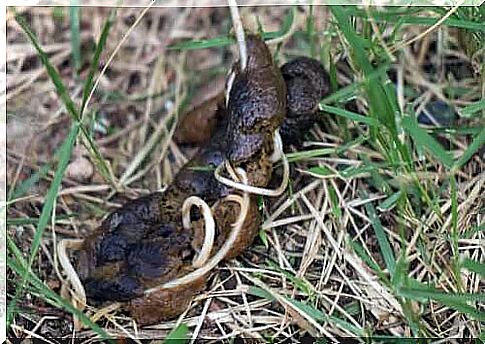Nematodes In Cats: How To Prevent It?

The control of nematodes in cats, as well as in other animals – domestic, farm and wild – is an important public health problem, especially in developing countries.
For those who live or work with animals, the management of parasites, both internal and external, is essential. The good health of the animals in your care will depend on it. So how can we prevent parasitic nematodes in cats?
Types of Nematodes in Cats
Nematodes are a phylum of vermiform invertebrate animals, that is, worm-shaped. They are relatively simple beings, have a well-formed digestive system, with a mouth, anus and digestive system. Also, they have a complex nervous system, although they do not have a respiratory and circulatory system. This group is believed to be made up of around 500,000 different species, many of them parasitic, like the ones we’ll see below.
Enterobius vermicularis
This small whitish parasite – no more than a centimeter long – is the cause of a disease called enterobiasis. Its ultimate host is man, although it can also parasitize dogs and cats. Infected individuals remain asymptomatic. Cats, by cleaning themselves with their tongues, distribute the eggs of this parasite throughout the body.
lumbricoid ascaris
Roundworm is one of the most common intestinal parasites among pets. Adult worms live in the intestines of cats. Their eggs, and even adult individuals, can escape in their feces. This parasite can become dangerous if left unchecked. It causes anemia, vomiting and diarrhea.

toxocara cati
Toxocara is one of the most common nematodes in cats. In puppies, a massive infection caused by this parasite can be fatal. Cats are infected by hunting infected animals or by mutual hygiene between infected congeners.
Are they contagious to humans?
Transmission of nematodes from cats to humans is not as common as with species that parasitize dogs. However, contagion can occur, so all of these parasites are considered potentially zoonotic .
The regions where these parasites are very present in humans are underdeveloped or developing areas. In places where crops are irrigated with fecal water, there are damming areas and the population’s hygiene is low due to lack of resources.
How to prevent nematodes in cats?
When you have cats or other pets at home, home hygiene, proper food handling and veterinary monitoring of the animals are essential to prevent the spread of nematodes in cats, especially possible reinfection.

To keep your cats healthy, we recommend that you take several actions:
- Prevent your cat from having access to open, unprotected areas. First, cats are a serious problem for urban birds, as they easily attack their young. Then, during his excursions, he will be able to hunt small mammals that will probably spread parasites , as well as other serious diseases. Finally, the pussy may fight with other cats and catch the feline immunodeficiency virus or leukemia, a dog may attack it, or it may be run over by a car.
- Maintain a protocol for internal and external deworming. There is no medicine that prevents nematodes, it is only possible to fight them when the infection already exists. Therefore, it is advisable to carry out deworming, whether or not there are nematodes in your cats.
- Create a routine for cleaning and disinfecting the beds, blankets, scratching posts, and toys your cat uses. Eggs can be exposed for days.
- Remove faeces from the litter box daily or whenever the animal uses it. Normally, nematode eggs need to spend several days in environmental conditions to activate and be able to parasitize.
- Clean feeders and drinkers daily. Cats are constantly cleaning themselves, and this can cause parasite eggs to end up in their bowls. On the other hand, these objects are sources of bacterial growth that can affect your pet’s oral health.









